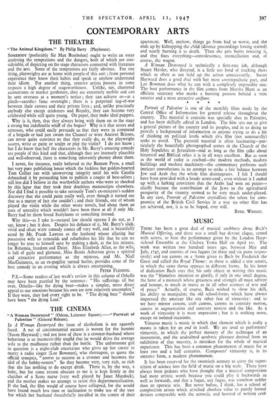THE CINEMA
"A Woman Destroyed" (Odeon, Leicester Square).—" Portrait of Palestine" (General Release).
IN A Woman Destroyed the issue of alcoholism is not squarely faced. A net of circumstantial excuses is woven for the heroine (Susan Hayward) ; and not least of these is a crooner-husband whose behaviour is so inconceivably stupld that he would drive the average wife to the madhouse rather than the bottle. The unfortunate girl in question is a night-club entertainer who gives up her career to marry a radio singer (Lee Bowman), who thereupon, to quote the official synopsis, "zooms to success as a crooner and becomes the idol of the bobby-soxers." So they become very, very rich, so rich that she has nothing to do except drink. There is, by the way, a baby, but for some reason obscure to me it is kept firmly in the clutches of a Scots nurse (very well played by Janet Murdock), and the mother makes no attempt to resist this departmentalisation. If she had, the film would of course have collapsed, for she would have found much less time or inclination to make use of the vast bar which her husband thoughtfully installed in the centre of their apartment. Well, anyhow, things go from bad to worse, and, she ends up by kidnapping the child (divorce proceedings having started) and nearly burning it to death. Then she gets burnt rescuing it, and that fixes everything—convalescence, reconciliation and, of course the wagon.
A
course, Destroyed is technically a first-rate job, although Stuart Heisler, who directed, is a little too fond of tracking shots which as often as not hold up the action unnecessarily. Susan Hayward does a good deal with her most unsympathetic part, and Lee Bowman does what he can with a completely impossible one. The best performance in the film comes from Marsha Hunt as an efficient secretary who masks a burning passion behind a trim exterior and a most attractive coiffure.
Portrait of Palestine is one of the monthly films made by the Central Office of Information for general release throughout the country. The material it contains was specially shot in Palestine, and has been skilfully edited in London. The film sets out to give a general picture of the country and its peoples, and in so doing to provide a background of information to anyone trying to do a bit of thinking on pol:tical levels which th;s film (not unnaturally) seeks to avoid. The pictorial material is often fascinating—par- ticularly the beautifully photographed scenes in the Church of the Holy Sepulchre at Jerusalem—and as long as the film talks about historical and Biblical relics it is in all ways excellent. But as soon as the world of today is reached—the modern methods, modern buildings and modern machinery—the commentary performs such intricate convolutions in an attempt to strike a fair balance between Jew and Arab that the whole film disintegrates. I felt I should have been provided with a handy score-card ; even without it I ended up with, a lurking conviction that the Arabs had won on points— chiefly because the contribution of the Jews to the agricultural prosperity of the country seemed to be very much under-played. In any case, Portrait of Palestine crystallises the talent for com- promise of the British Civil Service in a way no other film has yet achieved, nor, it is to be hoped, ever will.
BASIL WRIGHT.


































 Previous page
Previous page